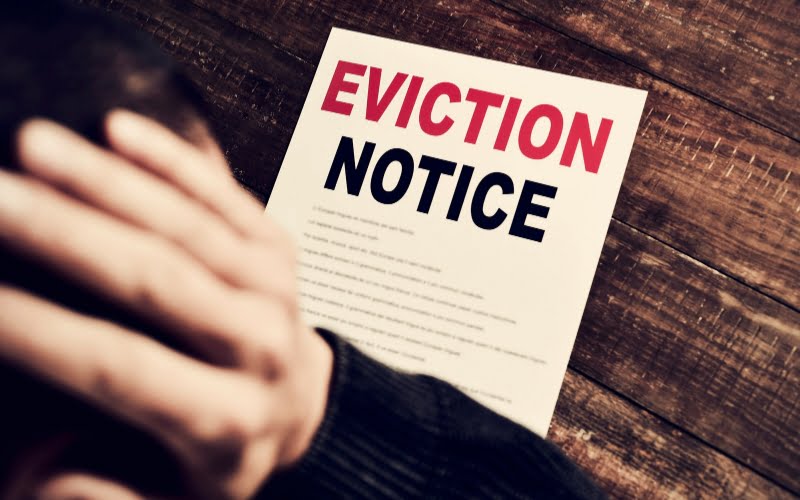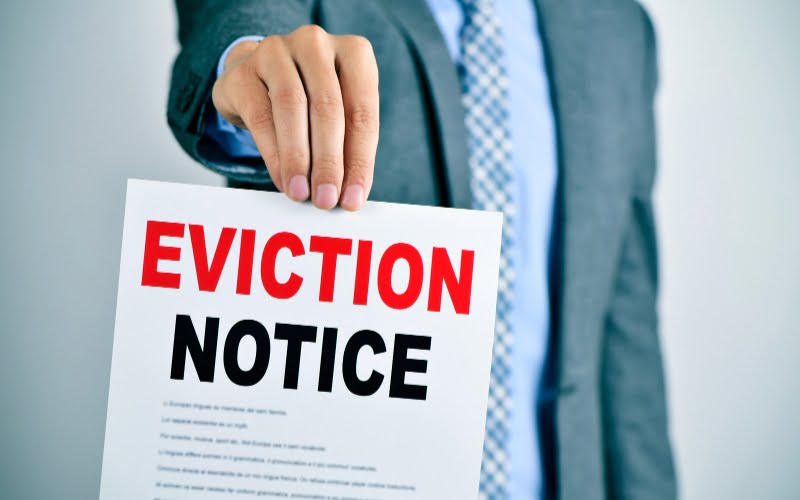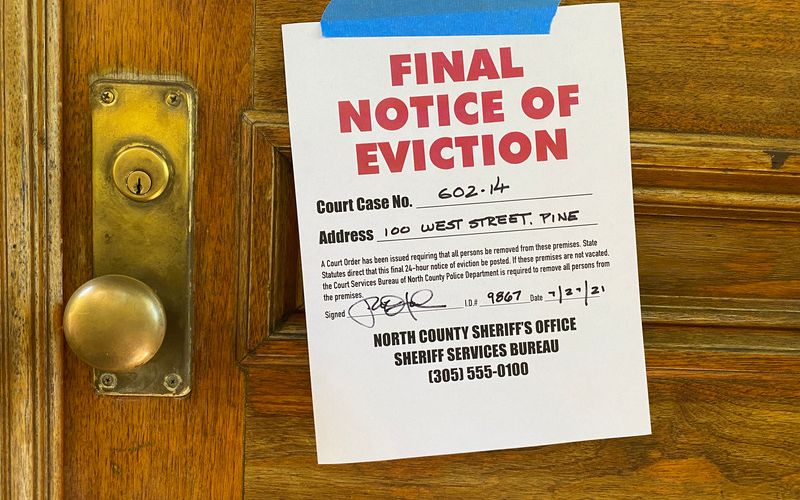Last Updated on October 21, 2023 by Kelvin Nielsen
Arkansas tenants have multiple responsibilities under Arkansas law (AR Code. Tit. 18. Ch. 17). Such as, paying rent on time and abiding by the terms of the lease agreement. Failure to do so can give your landlord the legal ground to evict you!
However, even when facing imminent eviction, there are multiple things you can do to stop or delay it.
How can a tenant stop an eviction in Arkansas?
The following are some tips to help you in this regard.
Understand what the eviction notice requires of you.
For a landlord to evict you, they first need to serve you with an eviction notice. The eviction notice will tell you what the eviction is all about. For instance, it’ll tell you the reason why the landlord is evicting you, how much time you have to move, and what you must do to correct it (if it’s curable).
The following are the eviction notices that Arkansas landlords must use to terminate a tenancy.
- 3-Day Notice to Quit. A landlord must use this notice when evicting a tenant for nonpayment of rent in Arkansas. They must serve it after the 5-day grace period is over. The notice will give you a maximum of 3 judicial days to leave. There is no option to pay the due rent.
- 10-Day Notice to Quit. This notice is reserved for tenants who fail to move after the initial 3-day notice to quit. This will give you a maximum of 10 days to move out of the property, or else the landlord pursues a criminal eviction.
- 14-Day Notice to Comply. This is meant for tenants who cause minor violations to the lease. Such as, parking in an unauthorized area or subletting the unit illegally. This will give you 14 calendar days to move out.
- Immediate Notice to Vacate. If you have committed an illegal activity, a landlord must use this notice on you. You’ll need to vacate the premises right away.
- 30-Day Notice to Vacate. This is meant for tenants who either have no lease or are renting on a month-to-month basis. It gives tenants 30 calendar days to move out.
Please note that a landlord won’t evict you immediately after the notice period is over. If you failed to abide by the eviction notice, your landlord may choose to escalate the matter by filing an eviction lawsuit.
Cure the violation committed.
Depending on the eviction notice served on you, you may be able to stop the eviction by simply curing the violation. For instance, paying all due rent within the 3 days will stop the eviction right away. Also, if you stop the behavior that’s causing your eviction, your landlord will have no other choice but to stop the eviction proceedings against you. (Ark. Code Ann. § 18-17-701).
If you aren’t able to fix the violation, you may want to talk to your landlord. Let them know, for example, why you may not be able to pay the due rent within the 3 days. Landlords know how costly and time-consuming an eviction process can be. As such, in most cases, they may be willing to settle the matter in other ways other than through the courts.
File an answer with the court.
If you don’t cure the violation and no other agreement is reached with the landlord, the matter could end up in court. The landlord will need to file a lawsuit in a Circuit Court or District Court.
If the filing is successful, the court’s clerk will issue them a copy of the summons and complaint. A copy will be served to you by either a sheriff, their deputy, or any other process server.
Once served, you’ll need to file an answer. This will provide you an opportunity to give a reason why the eviction against you should be stopped. If being evicted for nonpayment of rent, you’ll have a maximum of 10 days to file a response. For all other cases, you’ll have up to 5 days to file a response.
Wait for the court’s judgment.
After filing your answer, a hearing will be scheduled. The judge will provide both you and your landlord time to present your cases. If you fail to file an answer or fail to attend the hearing, the court will most likely issue a judgment against you. The landlord will then be issued with a Writ of Possession, returning possession of the property back to them.
If the judgment is in your favor, however, then you’ll continue renting the property at the same terms and conditions as before. You may also be able to sue the landlord for damages, as well as court and attorney fees.
4 Tenant Defenses to Eviction in Arkansas
Reason #1: The landlord used “self-help” eviction methods.
The only way a landlord may be able to evict a tenant in Arkansas is by obtaining a court order. A landlord must not try to evict you from the property through the use of force. Such methods include:
- Changing the locks.
- Removing your belongings from the unit.
- Shutting off utilities that are promised in the lease.
No matter the situation, a landlord must not take any of the aforementioned actions.
Reason #2: The landlord is carrying out a retaliatory eviction.
Your landlord cannot try to evict you in response to you exercising a legally protected right. Examples of legal rights available to Arkansas tenants include the following.
- Complaining to local authorities about habitability issues.
- Forming or joining a tenants’ union to advocate for your rights.
- Filing a lawsuit against the landlord for illegally raising rent, for instance.
Reason #2: The eviction is due to landlord discrimination.
As a tenant, you have a right to fair treatment as per the fair housing laws. As such, your landlord must not try to evict you for reasons such as your race, color, sex, familial status, disability, or nationality.
Reason #3: The eviction notice contained significant errors.
A landlord must serve a proper eviction notice as per Arkansas eviction laws. Making mistakes like serving improper notice or failing to state the effective date of eviction may invalidate the eviction process and the landlord may need to start all over again. This can provide you with extra time to plan your next move.
Reason #4: You cured the violation as required.
This can also stop your eviction. If you cure a violation, for instance, stop keeping an unauthorized pet, then the landlord must not continue with the eviction process against you.
Frequently Asked Questions (FAQs) : How to Stop an Eviction in Arkansas
Q: What are tenant defenses to eviction in Arkansas?
A: A defense to an eviction is a reason why you shouldn’t be evicted from your rental property. Some legitimate reasons to stop an eviction include: wrong termination notice, retaliatory eviction, discriminatory eviction, and “self-help eviction.
Q: How long does an eviction take in Arkansas?
A: From start to finish, expect the entire process to take anywhere between two to four weeks. It can also take a longer time depending on the specific reason for the eviction, or if you choose to contest and/or appeal.
Q: How do I respond to an eviction notice in Arkansas?
A: You can respond to an eviction notice in either of two ways. One, you can do so by doing exactly what the eviction notice wants you to do. For instance, pay the due rent within the notice period (3 days). This will stop the eviction immediately.
Or two, you could decide to file an answer with the courts. You’ll need to do this after being served by a sheriff, their deputy, or another process server, with a copy of the summons and complaint.
Q: Can you appeal an eviction in Arkansas?
A: Yes. Tenants in Arkansas have a right to appeal an eviction. But while you can do so, the appeal won’t stop the eviction, and you may still have to vacate the premises while your appeal is pending.
Also, you’ll need to give an appeal bond for a court-determined amount.
Q: Can a landlord lock you out in Arkansas?
A: No, this would be illegal. Locking you out of your rented premises would constitute a “self-help” eviction. It’s illegal. What’s more, it’d be equally illegal to shut off utilities, remove the doors, or remove your personal belongings.
Q: What rights do renters have in Arkansas?
A: Here is a guide to renters’ rights in Arkansas.
Q: How many days’ notice must be given to evict a tenant in Arkansas?
A: The amount of notice a tenant must receive depends on the reason for their eviction. For nonpayment of rent, for instance, a landlord must give you a 3-day notice. For lease violations, the landlord must give you a 14-day notice. For tenants without a lease, the landlord must give a 30-day notice.
Q: Is there a rent grace period in Arkansas?
A: Yes, there is a rent grace period in Arkansas. Tenants get to enjoy a 5-day grace period from the date rent is due. As such, landlords must wait for the 5-day grace period to end prior to serving an eviction notice for nonpayment of rent.
Q: How do I get an eviction off my record in Arkansas?
A: Well, you can do this in a myriad of ways. For one, you can take the matter to a court if you believe the eviction was unlawful. Two, you could pay your rental debts, for instance, any money you owe your landlord. And three, you could have collections removed from your credit report, and an eviction history cleared from your tenant-screening report.
Conclusion
There you have it – tips on how to stop an eviction in Arkansas. Just make sure to document relevant documents, notices, and communication you’ve had with your landlord. This can help you solidify your case against the landlord and help you win the eviction case.
Disclosure: The content herein isn’t a substitute for advice from a professional attorney. It’s only meant to serve educational purposes. If you have a specific question, kindly seek expert attorney services.
Sources: Arkansas law, Nolo.com, Arkansas Law Help, Arkansas Attorney General.

Hi, I’m Kelvin Nielsen, an experienced landlord and accomplished real estate lawyer. My focus is on answering your questions about renting in the hopes of making your life as a renter or a landlord a bit easier.







